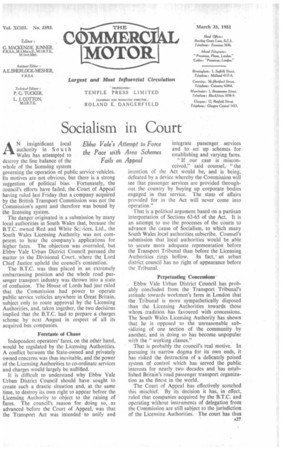Socialism in Court
Page 29

Page 30

If you've noticed an error in this article please click here to report it so we can fix it.
N insignificant local authority in South Wales has attempted to destroy the fine balance of the whole of the licensing system governing the operation of public service vehicles. Its motives are not obvious, but there is a strong suggestion of political bias. Fortunately, the council's efforts have failed, the Court of Appeal having ruled last Friday that a company acquired by the British Transport Commission was not the Commission's agent and therefore was bound by the licensing system.
The danger originated in a submission by many local authorities in South Wales that, because the B.T.C. owned Red and White Services, Ltd., the South Wales Licensing Authority was not competent to hear the company's applications for higher fares. The objection was overruled, but Ebbw Vale Urban District Council pursued the matter to the Divisional Court, where the Lord Chief Justice upheld the council's contention.
The B.T.C. was thus placed in an extremely embarrassing position and the whole road passenger transport industry was thrown into a state of confusion. The House of Lords had just ruled that the Commission had power to operate public service vehicles anywhere in Great Britain, subject only to route approval by the Licensing Authorities, and, taken together, the two decisions implied that the B.T.C. had to prepare a charges scheme by next August in respect of all its acquired bus companies.
Foretaste of Chaos Independent operators' fares, on the other hand, would be regulated by the Licensing Authorities. A conflict between the State-owned and privately owned concerns was thus inevitable, and the power of the Licensing Authorities to co-ordinate services and charges would largely be nullified.
It is difficult to understand why Ebbw Vale Urban District Council should have sought to create such a drastic situation and, at the same time, to destroy its own right to appear before the Licensing Authority to object to the raising of fares. The council's reason for doing so, as advanced before the Court of Appeal, was that the Transport Act was intended to unify and integrate passenger services and to set up schemes for establishing and varying fares.
"if our case is misconceived," said counsel, "the intention of the Act would be, and is being, defeated by a device whereby the Commission will see that passenger services are provided throughout the country by buying up corporate bodies engaged in that service. The state of affairs provided for in the Act will never come into operation."
That is a political argument based on a partisan interpretation of Sections 63-65 of the Act. it is an attempt to use the processes of the courts to advance the cause of Socialism, to which many South Wales local authorities subscribe. Counsel's submission that local authorities would be able to secure more adequate representation before the Transport Tribunal than before the Licensing Authorities rings hollow. In fact,' an urban district council has no right of appearance before the Tribunal.
Perpetuating Concessions ' Ebbw Vale Urban District Council has probably concluded from the Transport Tribunal's attitude towards workmen's fares in London that the Tribunal is more sympathetically disposed than the Licensing Authorities towards those whom tradition has favoured with concessions. The South Wales Licensing Authority has shown that he is opposed to the unreasonable subsidizing of one section of the community by another, and in doing so has become unpopular with the "working classes."
That is probably the council's real motive. In pursuing its narrow dogma for its own ends, it has risked the destruction of a delicately poised system of control which has served the public interests for nearly two decades and has established Britain's road passenger transport organization as the finest in the world.
The Court of Appeal has effectively scotched this mischief. By its decision it has, in effect, ruled that companies acquired by the B.T.C. and operating without instruments of delegation from the Commission are still subject to the jurisdiction of the Licensing Authorities. The court has thus temporarily removed the danger implicit in the decision of the House of Lords in the W. H. Smith case.
Only the London Transport Executive, among road passenger operators, holds an instrument of delegation from the B.T.C. and only it can run services without road service licences. There is, however, nothing to prevent the Commission from appointing each of the acquired companies as its agent and freeing them from all control. There is no indication that the B.T.C. contemplates taking this drastic step, but while the law remains in its present unsatisfactory form, the power to do so exists. A less scrupulous Minister of Transport than the present could direct the Commission to make full use of its dangerous power and run independent operators off the road without compensation. As an honourable gesture, the Minister should acknowledge the faulty drafting of the Transport Act by promoting amending legislation, at the earliest opportunity, to make clear the Commission's obligation to pay compensation in any instance in which a private operator's interests are harmed by the B.T.C.'s activities. If he will not do so voluntarily, the Parliamentary Opposition must take the necessary steps to ensure that some semblance of justice is preserved in the Act.




















































































